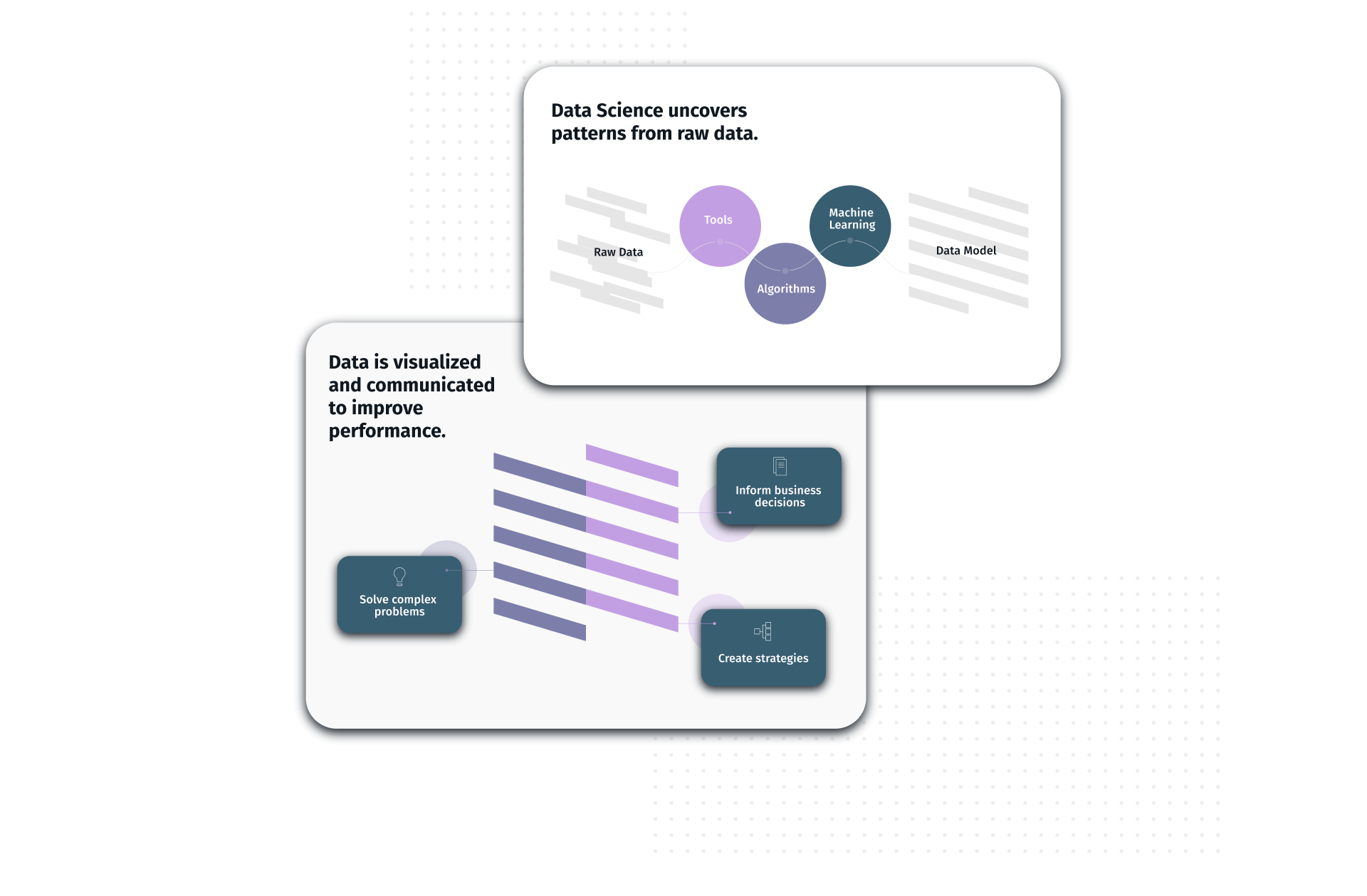
Data Science With Python
Bootcamp
Jumpstart your Data Science career in as little as 15 weeks.
Our curriculum has been updated to incorporate cutting-edge technologies, including the most recent advancements in artificial intelligence (AI) tools.
Embark on a Data Science Journey with Python
Unlock the possibilities of becoming a Data Scientist. Whether you have some prior experience with data, hold an existing degree, or are entirely new to the field, our data science course is designed for you. Regardless of your current career stage, our program will guide you from building foundational skills to acquiring advanced, hands-on knowledge in as little as 15 weeks.
This course is your gateway to kick-starting a new job, venturing into a fresh field, or entirely transforming your career path – the choice is yours.

What is Data Science?

Possible Career Paths
Data Analyst
Average Salary: $71,034*
The Data Analyst serves as a
gatekeeper for an organization’s
data so stakeholders can
understand data and use it to make
strategic business decisions.
*ZipRecruiter (May 2023)
BI Analyst
Average Salary: $87,815*
Business Intelligence Analysts
analyze data sets to discover
insights, often used for important
decision-making strategies
throughout an organization.
*ZipRecruiter (May 2023)
AI Engineer
Average Salary: $145,898*
AI engineers are primarily
responsible for developing, testing,
and deploying new applications and
systems that utilize AI to improve
performance and efficiency.
*ZipRecruiter (May 2023)
Data Scientist
Average Salary: $126,687*
Data Scientists gather and analyze
large sets of structured and
unstructured data. They interpret
results to create actionable plans
for their organizations.
*ZipRecruiter (May 2023)
Data Science Curriculum
Introduction to Data Science and Python Basics
This course serves as an introduction to the field of data science, focusing on the basics of Python programming language as a tool for data analysis and manipulation. It covers fundamental concepts such as data structures, control flow, and functions, enabling students to acquire the necessary skills to process and analyze data effectively for various applications in data science.
Data Cleaning and Preprocessing
This course is centered around data cleaning and preprocessing techniques in the field of data science. Students will learn various methodologies to handle missing data, outliers, and inconsistencies within datasets, as well as techniques for data transformation and normalization. The course emphasizes the importance of data quality and prepares students to effectively preprocess datasets to ensure accurate and reliable analysis results in their data science projects.
Introduction to SQL and Database Management
This course provides an introduction to SQL (Structured Query Language) and the fundamentals of database management. It focuses on teaching students the basics of creating, querying, and managing relational databases. Students will learn essential SQL commands and database management concepts, equipping them with the necessary skills to handle data effectively and efficiently in various applications and industries.
Exploratory Data Analysis (EDA)
This course focuses on the principles and techniques of Exploratory Data Analysis (EDA) in the context of data science. Students will learn how to summarize, visualize, and interpret data sets to gain insights and identify patterns and relationships within the data. The course emphasizes the use of various statistical and graphical methods to understand the underlying structure of data, enabling students to make informed decisions and formulate hypotheses for further analysis and modeling.
Supervised Learning - Regression
This course delves into supervised learning techniques, specifically focusing on regression analysis in the context of machine learning. Students will learn about various regression models and algorithms, exploring how to predict and model the relationships between variables in datasets. The course emphasizes the practical application of regression analysis for making continuous predictions and estimates, enabling students to understand and implement predictive modeling in real-world scenarios.
Supervised Learning - Classification
This course delves into supervised learning techniques, focusing specifically on classification methods in the context of machine learning. Students will learn about various classification algorithms and models used to categorize data points into predefined classes or categories. The course emphasizes the practical application of classification techniques for pattern recognition, prediction, and decision-making tasks, enabling students to develop a comprehensive understanding of how to implement and evaluate classification models for diverse applications in data analysis and prediction.
Unsupervised Learning - Clustering
This course focuses on unsupervised learning methods, specifically centering on clustering algorithms in the context of machine learning. Students will learn various techniques for grouping data points into clusters based on similarities or patterns. The course emphasizes practical applications of clustering for data segmentation and pattern recognition, enabling students to gain insights into the underlying structure of data and make informed decisions based on the identified clusters.
Dimensionality Reduction and Feature Extraction
This course centers on the principles and techniques of dimensionality reduction and feature extraction in the context of data science and machine learning. Students will learn various methods to reduce the number of random variables under consideration, aiming to obtain a smaller set of features that are more manageable, interpretable, and efficient for analysis. The course emphasizes the practical applications of dimensionality reduction and feature extraction for simplifying complex datasets and improving the performance of machine learning models.
Machine Learning Project Part 1
The Machine Learning Project Part 1 course is a comprehensive module that focuses on the initial stages of implementing a machine learning project. It covers data collection, preprocessing, and exploratory data analysis, providing students with hands-on experience in preparing datasets for analysis. Additionally, the course emphasizes the selection and implementation of appropriate machine learning algorithms to establish a foundation for building predictive models in subsequent project stages.
Machine Learning Project Part 2
The Machine Learning Project Part 2 course is a continuation of the comprehensive module, focusing on advanced stages of implementing a machine learning project. It emphasizes the application of various modeling techniques, model evaluation, and tuning to improve model performance. Additionally, the course covers the interpretation and communication of results, enabling students to gain a deeper understanding of the intricacies of machine learning applications and their practical implications.
Introduction to Artificial Intelligence (AI)
This course provides an introduction to the fundamental concepts and applications of Artificial Intelligence (AI). It covers various topics such as machine learning, natural language processing, and computer vision, giving students a foundational understanding of AI’s capabilities and its potential impact on diverse fields. The course emphasizes the basic principles and approaches used in AI systems, enabling students to grasp the fundamental concepts that underpin the development and implementation of AI technologies.
AI Project and Final Presentations
The AI Project and Final Presentations course is designed to provide students with the opportunity to apply their knowledge and skills in Artificial Intelligence (AI) to a real-world project. The course focuses on guiding students through the entire project lifecycle, including problem formulation, data collection, model development, and evaluation. Additionally, the course emphasizes effective communication and presentation skills, allowing students to showcase their AI project results and demonstrate their understanding of AI concepts and methodologies to a broader audience.
Tailoring Your Course Pace to Your Professional Life
While some of our students can commit to full-time campus attendance, others have various responsibilities like jobs, family, or personal obligations to consider. Regardless of the path you select, success will demand dedication and a strong work ethic. In just a few weeks, you’ll acquire valuable skills that have the potential to significantly improve your future prospects.
Accelerated Boot Camp
Learn like it’s your top priority. This intensive boot camp is designed for those who can commit full-time to their studies.
15 weeks long
You’ll benefit from daily interactions with your cohort, collaborative group projects with instructor guidance, paired programming sessions, lab time with instructional staff, and a strong sense of community support. This option is best suited for students who thrive in a structured, immersive learning environment with live lectures.
Best for who are students seeking rapid skill acquisition and career transformation.
Available in-person and online
Explore Our Tech Prep Lessons
Unlock the world of tech with our free tech prep lessons. These introductory offerings are designed to give you
a taste of what learning with us is like and help you determine if a boot camp is the right choice for you.
Software Engineering
Get started with the fundamentals
of software engineering.
Data Science
Dive into Python essentials,
data visualization, and more
in this introduction to data
science.
Cybersecurity
Explore the basics of cybersecurity,
covering networks, Linux,
and Python essentials.
Our Core Values

Professionalism

Innovation

Integrity

Self-Discipline

Transparency
Discover Your Career Transformation Path – Chat with Admissions Today!
Take the initial steps towards reshaping your career by scheduling a 10-minute chat with our admissions team.